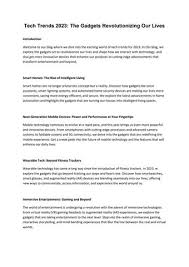The Impact of Technology on Society
Technology has become an integral part of our daily lives, shaping the way we communicate, work, and interact with the world around us. From the invention of the wheel to the rise of artificial intelligence, technological advancements have significantly impacted society in various ways.
Communication Revolution
One of the most significant effects of technology is its impact on communication. With the advent of smartphones, social media platforms, and instant messaging apps, people can now connect with others across the globe in real time. This interconnectedness has transformed how we share information, collaborate on projects, and maintain relationships.
Workplace Transformation
Technology has also revolutionised the way we work. Automation and digital tools have streamlined processes, increased efficiency, and opened up new possibilities for remote work. The rise of artificial intelligence and machine learning is reshaping industries and creating new job opportunities in fields such as data science and cybersecurity.
Social Change
Advancements in technology have brought about significant social change. From online activism to crowdfunding platforms, technology has empowered individuals to raise awareness about important issues and drive positive change in their communities. Social media has also played a crucial role in shaping public discourse and mobilising support for various causes.
Economic Growth
The tech industry has become a major driver of economic growth worldwide. Tech giants like Google, Apple, and Amazon have not only revolutionised industries but also created thousands of jobs and contributed to GDP growth. Start-ups and entrepreneurs are leveraging technology to innovate and disrupt traditional business models.
Challenges Ahead
Despite its many benefits, technology also poses challenges for society. Issues such as data privacy, cybersecurity threats, digital divide, and job displacement due to automation require careful consideration and proactive solutions. As we continue to embrace technological advancements, it is essential to address these challenges to ensure a sustainable future for all.
In Conclusion
Technology’s impact on society is undeniable. It has transformed how we live, work, communicate, and interact with one another. As we navigate this ever-changing digital landscape, it is crucial to harness the power of technology responsibly and ethically to create a more inclusive and equitable world for future generations.
Understanding Technology: Impact, Challenges, and Societal Changes
- What is the impact of technology on society?
- How has technology revolutionised communication?
- What are the effects of technology on the workplace?
- How has technology brought about social change?
- What role does technology play in economic growth?
- What are the challenges associated with technology advancement?
- How does technology affect data privacy and cybersecurity?
- What measures can be taken to address job displacement due to automation?
What is the impact of technology on society?
The impact of technology on society is profound and multifaceted. Technology has revolutionised the way we communicate, work, and interact with the world around us. From the rapid exchange of information facilitated by digital platforms to the automation of tasks that have streamlined industries, technology has significantly transformed our daily lives. It has also brought about social change, economic growth, and new challenges such as data privacy concerns and job displacement due to automation. Understanding and navigating the implications of technology’s influence on society is crucial as we strive to create a future that harnesses its benefits while addressing its potential drawbacks.
How has technology revolutionised communication?
Technology has revolutionised communication in unprecedented ways, reshaping the very fabric of how we interact and connect with one another. From the evolution of telephones to the advent of social media platforms and instant messaging apps, technology has made communication faster, more accessible, and more efficient than ever before. The ability to communicate instantly with anyone around the world has broken down geographical barriers and facilitated global connectivity. With video calls, emails, and social networking sites becoming integral parts of our daily lives, technology has not only transformed how we share information but also how we build relationships and collaborate on a global scale.
What are the effects of technology on the workplace?
The effects of technology on the workplace are profound and far-reaching. Automation and digital tools have streamlined processes, increased efficiency, and transformed traditional work environments. From remote collaboration to data analysis, technology has enabled employees to work more flexibly and productively. However, these advancements also raise concerns about job displacement due to automation and the need for upskilling to adapt to evolving technological demands. Overall, technology has revolutionised the modern workplace, creating new opportunities for innovation and growth while also posing challenges that require careful consideration and adaptation.
How has technology brought about social change?
Technology has brought about significant social change by empowering individuals to connect, communicate, and collaborate on a global scale. From social media platforms that amplify voices and mobilise communities to online activism that raises awareness about pressing issues, technology has revolutionised how we engage with society. The accessibility of information and the ability to share diverse perspectives have fostered a more interconnected world where people can advocate for change, challenge traditional norms, and drive positive societal transformations. Technology has democratised communication and enabled individuals to participate in shaping the social landscape like never before.
What role does technology play in economic growth?
Technology plays a pivotal role in driving economic growth by fostering innovation, increasing productivity, and creating new opportunities for businesses. Through the development of cutting-edge technologies and digital solutions, industries can streamline processes, reduce costs, and reach new markets. Moreover, technology enables the emergence of new sectors and job opportunities, stimulating economic activity and boosting overall productivity. By investing in research and development, embracing digital transformation, and leveraging technological advancements, countries can enhance their competitiveness on the global stage and pave the way for sustainable economic growth in the digital age.
What are the challenges associated with technology advancement?
The challenges associated with technology advancement are multifaceted and require careful consideration. One significant challenge is the issue of data privacy and security, as the increasing digitisation of information raises concerns about the protection of personal data. Cybersecurity threats pose a constant risk to individuals, businesses, and governments, highlighting the need for robust measures to safeguard digital assets. Additionally, the widening digital divide exacerbates inequalities in access to technology and information, limiting opportunities for those who lack connectivity. Moreover, the potential job displacement caused by automation and artificial intelligence technologies raises questions about workforce reskilling and adaptation in a rapidly evolving technological landscape. Addressing these challenges requires a proactive approach that balances innovation with ethical considerations to ensure a sustainable and inclusive future for all.
How does technology affect data privacy and cybersecurity?
Technology has a profound impact on data privacy and cybersecurity in today’s digital age. The rapid advancement of technology has led to the collection and storage of vast amounts of personal data, raising concerns about privacy breaches and data misuse. Cybersecurity threats, such as hacking, phishing, and malware attacks, have become more sophisticated with the evolution of technology, posing significant risks to individuals and organisations. As technology continues to shape our lives, it is essential to implement robust security measures, educate users on best practices, and develop stringent data protection regulations to safeguard sensitive information and mitigate cybersecurity risks effectively.
What measures can be taken to address job displacement due to automation?
In response to the frequently asked question about addressing job displacement caused by automation, several measures can be implemented to mitigate its impact on the workforce. Firstly, investing in retraining and upskilling programmes can help workers adapt to the changing job market and acquire skills that are in demand. Collaborative efforts between governments, businesses, and educational institutions are essential to ensure that workers have access to relevant training opportunities. Additionally, fostering a culture of lifelong learning and promoting entrepreneurship can empower individuals to explore new career paths and create their own opportunities in emerging industries. Embracing policies that support job transition assistance, income support, and job creation in sectors less susceptible to automation can also play a crucial role in addressing the challenges posed by technological advancements in the workforce.




